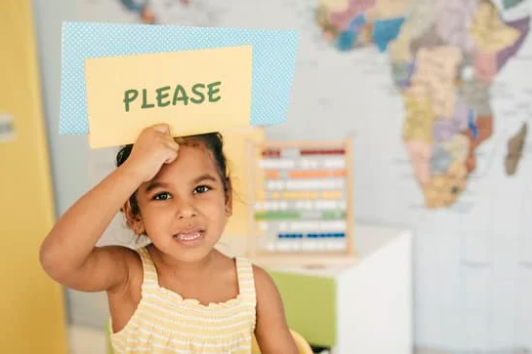How to Teach Manners to Preschoolers
Your child was born with certain innate abilities, but chances are, being polite is not one of them. Not to say that your kid is impolite, but etiquette is something that must be taught. Like any habit, it isn’t going to just happen overnight, but by approaching it with patience, you can teach your child how to have good manners.
Why Manners Are Important
Some people associate the term “manners” with debutante balls and fancy restaurants, but when it comes down to it, manners are about being considerate of others. Manners are less about eating your salad with the right fork than they are being aware that the people around you have feelings that can be affected by your behavior. In essence, having good manners means that you behave in such a way that shows respect.
Teaching Your Child to Be Polite
If you’re not sure where to begin with teaching your child manners, here are some great places to start.
Greetings
A simple, polite skill your child can master is making a point to greet people. When someone comes over, make sure your child at least waves to greet them. If this doesn’t work as well, it can be helpful to point out a detail about the person; for example, you might point out the person’s eye color so they make eye contact. Over time, you can teach them how to shake hands. You might practice this at home, making a game of greeting each other.
Be a Respectful Role Model
Set a good example for your child by using manners throughout the day and demonstrating kindness and respect for others. This is the most important and effective way to shape good behavior.
Show Your Personal Example
The best way for parents to teach children good manners is to be well-mannered persons by themselves. Children look to their parents for leads on how to behave. If you are an ill-mannered person, your children may pick up your behaviors. Therefore, if you want to bring up well-mannered children, don’t forget to be polite with other persons, relatives, and children as well. In this case, you may be pretty sure that your children will take such behavior as a model and use it every day in each situation.
Nurture Respect and Sensitivity
Respect towards other people is the basis of good manners, and sensitivity is a root of respect. In this case, you as a parent are responsible for growing sensitivity in your children. In many cases, sensitive children will be more successful in communicating with other people. Don’t neglect your children’s sensitivity, and nurture their understanding of respect by emulating respectful behavior towards others.
Using Polite Words
You may already be asking your child to use “the magic word,” but beyond “please,” you want to teach your child other polite words. Saying “excuse me” and “thank you” are also age-appropriate words they should be practicing. The best way to accomplish this is by modeling the behavior. Remember that your child wants to be like you, so if you’re using polite language, they will naturally pick up on it.
Set Personal Boundaries
Although some of us dream about a perfectly polite society, parents should not forget that each person, including their children, has his or her own personal boundaries which must be respected. True respect for other people is impossible without strong personal boundaries. Therefore, don’t forget to teach your children to know how to say “no” in different situations. Help your children understand and formulate their own personal boundaries, as well as how to protect them.
Staying at the Table During Meals
When you have a preschooler, meal times can feel like a marathon. It might be a lot to expect them to stay seated at the table for half an hour, but ten to fifteen minutes should be manageable. Teach your child that dinner is family time so the expectation is for them to stay seated at the table till everyone is finished eating. You can make this the norm by having a consistent mealtime routine. In addition, avoid feeding them snacks before a meal so that they are hungry for it, make it a rule that food has to be eaten at the table, and have them help set the table. If table manners prove to be challenging, you can set up a sticker chart to give them a reward for good behavior.
Not Interrupting
You’re on the phone, and you feel someone tugging on your pants. When your child wants your attention, they don’t want to wait for it. But if your child is old enough, they should be able to occupy themselves for a few minutes while you handle something else. Explain that when you’re on the phone, they should not interrupt unless it is an emergency.

